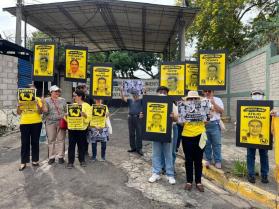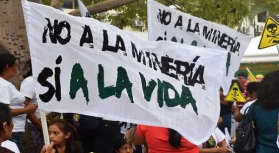The 2019 CISPES National Convention: A Salvadoran Youth Organizer’s Perspective
by Erik Villalobos, CISPES National Office Intern
The 2019 CISPES Convention was definitely an unforgettable experience. It was my first convention and I was very glad I was able to be a part of it.
Before the convention, I didn’t know what to expect. As an intern at the National Office, I had translated several of the proposals about what CISPES’ highest political and organizational priorities should be given the right-wing’s return in El Salvador and the Trump Administration’s war on the peoples of Central America, those who are in the region and those who are here as immigrants. But I still had little understanding of the process itself.
I’ll admit that when Convention began, I felt a little confused but I ended up walking out with not only a stronger understanding of our democratic decision making process but a stronger personal connection with CISPES, the struggle for social and economic justice, y mi pueblo de El Salvador!
During the convention, representatives from all CISPES chapters, staff and allies from El Salvador spent three days debating and voting on proposals. It was really interesting to compare the realities among chapters in different cities and of course to hear the perspectives from El Salvador. In the end we defined priorities that will help us build a stronger movement here in the U.S. as we respond to the calls for solidarity from the Salvadoran popular movement.
One of the major highlights was getting to spend time with leaders from El Salvador: Karen Ramírez from the National Alliance against Water Privatization, Lourdes Palacios from the leftist FMLN party and Estela Ramírez, from a garment workers’ union. These compañeras taught me a lot about the social movements in El Salvador and how significant their impact is on Salvadoran society.
I remember speaking to Estela about my Salvadoran family’s concerns with my interest in the FMLN, sharing that, as a result of the war, it is difficult for my family to sympathize with “los guerrilleros.” She reminded me that being of the left does not require a political affiliation and told me to focus on my work, education, and future. I noticed that Estela and the other compañeras showed a lot of love and concern for all of us in CISPES. They felt the need to help us in any way they could and it shows, because I was definitely not the only one who felt that kind of support from them.
The other highlight was getting to meet Salvadorans from other chapters who were around my age and had similar interests. Before getting involved in CISPES, I felt like I never had the space to talk about Salvadoran politics, history, the struggle against U.S. intervention, and my experiences as a first-generation Salvadoran born and raised in the U.S. Getting to meet more U.S. Salvadorans brought me into a space I always dreamed of having. We were able to talk about our experiences, perspectives, and the role we should be playing in the solidarity movement and in CISPES.
I left the convention with a stronger sense of what I want to accomplish in the future. Deciding to move to DC for this internship was a huge step for me and I had my doubts about what would come next. But the convention gave me comfort in understanding why I wanted to try something new. The people I met, the conversations I had, and the whole experience could be seen as an example of why I came to Washington, DC.

 "I am a CISPES supporter because continuing to fight for social justice and a more people-centered country means continuing the dream and sacrifice of thousands of my fellow Salvadorans who died for that vision.” - Padre Carlos, New York City
"I am a CISPES supporter because continuing to fight for social justice and a more people-centered country means continuing the dream and sacrifice of thousands of my fellow Salvadorans who died for that vision.” - Padre Carlos, New York City

